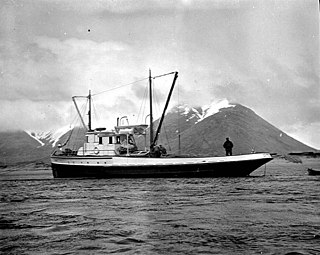
King Cove is a city in Aleutians East Borough, Alaska, United States. As of the 2010 census, its population was 938, up from 792 in 2000, but at the 2020 census this had reduced to 757.
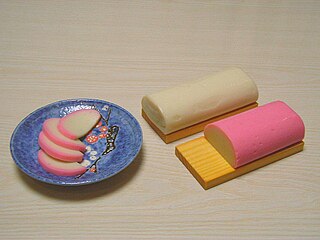
Kamaboko (蒲鉾:かまぼこ) is a type of cured surimi, a processed seafood product common in Japanese cuisine.
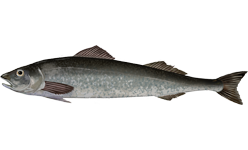
The sablefish is one of two members of the fish family Anoplopomatidae and the only species in the genus Anoplopoma. In English, common names for it include sable (US), butterfish (US), black cod, blue cod (UK), bluefish (UK), candlefish (UK), coal cod (UK), snowfish, coalfish (Canada), beshow, and skil (Canada), although many of these names also refer to other, unrelated, species. The US Food and Drug Administration accepts only "sablefish" as the acceptable market name in the United States; "black cod" is considered a vernacular (regional) name and should not be used as a statement of identity for this species. The sablefish is found in muddy sea beds in the North Pacific Ocean at depths of 300 to 2,700 m and is commercially important to Japan.
The Pacific Whiting Conservation Cooperative (PWCC) is a harvest and research cooperative formed by three companies that participate in the catcher/processor sector of the Pacific whiting fishery – American Seafoods, Glacier Fish Company, and Trident Seafoods.

A fishcake is a culinary dish consisting of filleted fish or other seafood minced or ground, mixed with a starchy ingredient, and fried until golden.

Trident Seafoods is the largest seafood company in the United States, harvesting primarily wild-caught seafood in Alaska.

The term fish processing refers to the processes associated with fish and fish products between the time fish are caught or harvested, and the time the final product is delivered to the customer. Although the term refers specifically to fish, in practice it is extended to cover any aquatic organisms harvested for commercial purposes, whether caught in wild fisheries or harvested from aquaculture or fish farming.

A fish fillet, from the French word filet meaning a thread or strip, is the flesh of a fish which has been cut or sliced away from the bone by cutting lengthwise along one side of the fish parallel to the backbone. In preparation for filleting, any scales on the fish should be removed. The contents of the stomach also need careful detaching from the fillet. Because fish fillets do not contain the larger bones running along the vertebrae, they are often said to be "boneless". However, some species, such as the common carp, have smaller intramuscular bones called pins within the fillet. The skin present on one side may or may not be stripped from the fillet. Butterfly fillets can be produced by cutting the fillets on each side in such a way that they are held together by the flesh and skin of the belly.

The Alaska pollock or walleye pollock is a marine fish species of the cod genus Gadus and family Gadidae.

Crab meat or crab marrow is the meat found within a crab, or more specifically in the leg of a crab. It is used in many cuisines around the world for its soft, delicate and sweet flavor. Crab meat is low in fat and provides approximately 340 kilojoules (82 kcal) of food energy per 85-gram (3 oz) serving. Brown crab, blue crabs, blue swimming crabs, and red swimming crabs are among the most commercially available species of crabmeat globally.
A fish company is a company which specializes in the processing of fish products. Fish that are processed by a fish company include cod, hake, haddock, tuna, herring, mackerel, salmon and pollock.
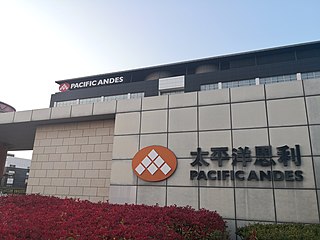
Pacific Andes International Holdings is an Asian vertically integrated seafood company.
Pacific Seafood is one of the largest seafood companies in North America. The company launched in 1941 as a small, fresh seafood retail operation in Portland, Oregon, United States. The family-owned business expanded to become one of the largest vertically integrated seafood processing and distribution companies in the United States. Pacific's president and CEO, Frank Dulcich, is the grandson of the company's founder, also named Frank Dulcich. Pacific Seafood has over 2500 employees and is headquartered in Clackamas, Oregon.

Cod and other cod-like fish have been widely used as food through history. Other cod-like fish come from the same family (Gadidae) that cod belong to, such as haddock, pollock, and whiting.

Crab sticks, krab sticks, snow legs, imitation crab meat, or seafood sticks are a Japanese seafood product made of surimi and starch, then shaped and cured to resemble the leg meat of snow crab or Japanese spider crab. It is a product that uses fish meat to imitate shellfish meat.

Surimi is a paste made from fish or other meat. The term can also refer to a number of East Asian foods that use that paste as their primary ingredient. It is available in many shapes, forms, and textures, and is often used to mimic the texture and color of the meat of lobster, crab, grilled Japanese eel or shellfish.

Alaska pollock, a species of cod (Gadus) found in the North Pacific ocean, is used as food globally. Compared with common pollock, Alaska pollock is milder in taste, whiter in color, and lower in oil content.
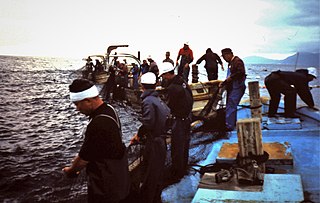
A fishery cooperative, or fishing co-op, is a cooperative in which the people involved in the fishing industry pool resources, in their certain activities from farming, catching, distribution, and marketing of fish.

Gyoniku sausage is a Japanese fish sausage made from surimi. It is sold in a plastic casing as a snack. Gyoniku soseji is similar to the traditional fish cake, kamaboko. Gyoniku soseji and kamaboko together constitute 26% of Japanese fish consumption.
















